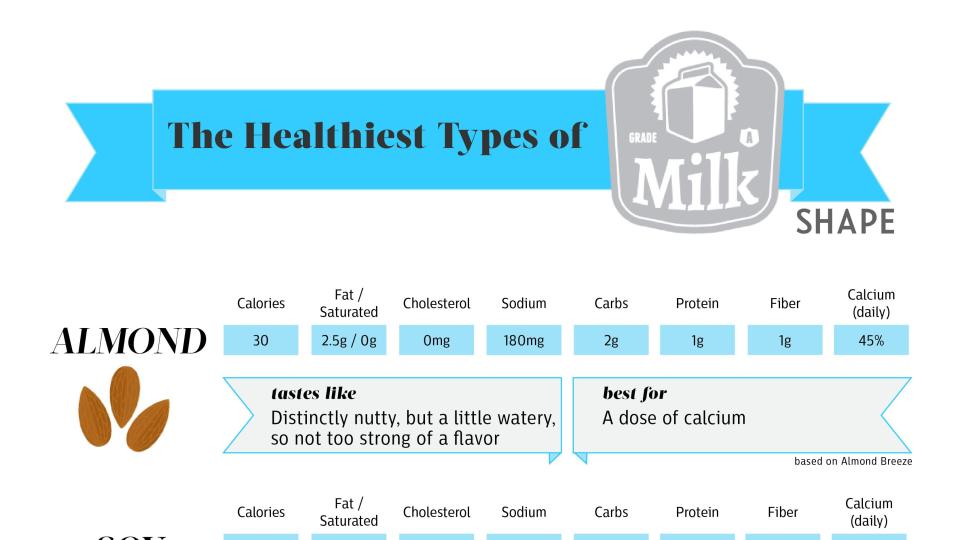13 Types of Milk That Do Your Body Good
The days when your biggest milk decision was whole versus skim are long gone-milk options now take up nearly half an aisle at the supermarket. Whether you want variety with your morning meal or simply a non-dairy option that doesn't taste like cardboard, there's an option out there for you!
With the help of Alexandra Caspero, R.D., owner of weight management and sports nutrition service Delish Knowledge, we broke down the nutrition data for some of the most popular milk varieties-and even included your safest bet for what to pair each with.

It's great to know how your favorite nut milk stacks up compared to a cow's, but here's the real question: How should you use that milk? Trust us, there's always a way-which is why we rounded up the best options for bringing these newly-discovered options into your kitchen, whether that means swapping out your traditional dairy for a tastier (and sometimes healthier!) alternative, or using your old standby in an entirely new way. Read up, then enjoy!
For calcium: Almond milk
Why: With more calcium (45 percent of your daily recommended serving) than cow's milk, almond milk is the perfect milk substitute for keeping your bones strong and healthy.
For smoothies: Soy milk
Why: Smoothies are a quick and easy way to refuel after a routine sweat session, and, with seven grams of protein per serving, soy milk is a better post-workout choice than almond or coconut. Plus, this diary-free milk will add flavor and texture to a blended drink, so your muscles and tastebuds will be thanking you all day.
For cereal: Rice milk
Why: Full of sweet, rich flavor, rice milk will make you want to finish every last spoonful of your cereal before heading out the door.
For mashed potatoes: Hemp milk
Why: Opting for hemp milk instead of heavy cream will leave you feeling lighter, while still adding texture and flavor to this comforting dish.
For cookies: Flax milk
Why: With only 25 calories and 2.5 grams of fat per serving, flax milk is a healthier alternative to regular dairy milk when you want to indulge your chocolate chip cravings. (It's one of the Top 25 Natural Appetite Suppressants, so you'll eat fewer too!)
For coffee: Hazelnut milk
Why: Skip the traditional creamer for a milk that adds a rich, slightly nutty taste to your morning brew without being overwhelmingly sweet-and it has only 3.5 grams of fat per serving to boot.
For homemade soup: Coconut milk
Why: Next time you decide to tackle one of the soup recipes on your Pinterest board, try substituting coconut milk to score creamy texture and rich flavor without the fat of the regular stuff.
For pancake mix: Oat milk
Why: Replace traditional milk with oat milk-its sweet, rich taste will help satisfy your sweet tooth.
For salad dressing: Cashew milk
Why: Substitute cashew milk in your next homemade sauce for a thicker texture and added flavor without the calories or fat.
For yogurt: Goat milk
Why: Yogurt is a powerhouse of a snack, but the regular stuff can get old day after day. With eight grams of protein and 30 percent of your recommended daily intake of calcium, goat milk yogurt is a great alternative to keep you satiated and energized.
For protein: Skim milk
Why: Looking for a quick way to add protein to your diet? With nine grams per serving, don't underestimate the power of a glass of skim milk to help fuel those muscles. (Are you dairy-free? Stick with soy over other milk alternatives.)
For tea: 2% milk
Why: Take your tea British style with 2% milk. It not only offers a smooth texture and that classic, rich milk taste, it also adds eight grams of protein per cup.
For oatmeal: Whole milk
Why: If your morning bowl of oatmeal needs a pick-me-up, try adding a dash of whole milk. The creamy taste and texture, along with the eight grams of protein, will help you start the day off right.

